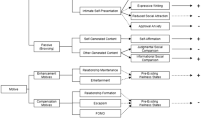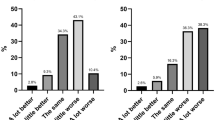Abstract
Previous Chinese research on adolescent life stress adopted life event scales that were directly translated from Western measures. To address the methodological and cultural issues overlooked by the “import” approach, the present research aimed at constructing a life event scale for Hong Kong adolescents. Study 1 was conducted to congregate items for the Chinese Adolescent Life Event Scale (CALES). The CALES contains 44 items derived from 618 Hong Kong adolescents. Study 2 revealed adequate test–retest reliability and criterion-related validity for the CALES. Moreover, the CALES yielded stronger relationships with depression than did the translated life event measures. Results suggest that the CALES is appropriate for assessing life events for Hong Kong adolescents. Both unique features of the CALES and life events found only in the translated measures are examined. Implications for Chinese research on life stress are discussed.
Similar content being viewed by others
REFERENCES
Bond, M. H., & Hwang, K. K. (1986). The social psychology of Chinese people. In M. H. Bond (Ed.), The psychology of the Chinese people (pp. 213–266). New York: Oxford University Press.
Boys' and Girls' Clubs Association of Hong Kong (1992). Report on the study of adolescent depression. Hong Kong: Author.
Brand, A. H., & Johnson, J. H. (1982). Note on reliability of the Life Events Checklist. Psychological Reports, 50, 1274.
Brown, G. W. (1974). Meaning, measurement, and stressful life events. In B. S. Dohrenwend & B. P. Dohrenwend (Eds.), Stressful life events: Their nature and effects (pp. 217–243). New York: Wiley.
Brown, G. W. (1981). Life events, psychiatric disorder and physical illness. Journal of Psychosomatic Research, 25, 461–473.
Chan, C. M., & Tsoi, M. M. (1984). The BDI and stimulus determinants of cognitive-related depression among Chinese college students. Cognitive Therapy and Research, 8, 501–508.
Chen, Y., Luo, S., & Lin, J. (1993). Family life events and childhood psychoses. Chinese Mental Health Journal, 7, 203–205.
Cheng, C. (in press). Role of perceived social support on depression of Chinese adolescents: A prospective study examining the buffering model. Journal of Applied Social Psychology.
Cheng, C, Bond, M. H., & Chan, S. C. (1995). The perception of ideal best friends by Chinese adolescents. International Journal of Psychology, 30, 91–108.
Choy, B. K., Lam, C. M., & Ngai, S. Y. (1990). Stress and social support among young people. Hong Kong: Scout Association of Hong Kong.
Chu, K. S. (1980). The psychology of sex differences. Taipei: Taiwan Commercial Press.
Coddington, R. D. (1972). The significance of life events as etiologic factors in the diseases of children—II. A study of a normal population. Journal of Psychosomatic Research, 16, 205–213.
Cohen, J. (1968). Weighted kappa: Nominal scale agreement with provision for scaled disagreement or partial credit. Psychological Bulletin, 70, 213–220.
Compas, B. E. (1987). Stress and life events during childhood and adolescence. Clinical Psychology Review, 7, 275–302.
Compas, B. E., Davis, G. E., Forsythe, C. J., & Wagner, B. M. (1987). Assessment of major and daily stressful events during adolescence: The Adolescent Perceived Events Scale. Journal of Consulting and Clinical Psychology, 55, 534–541.
Dien, D. S. (1983). Big me and little me: A Chinese perspective on self. Psychiatry, 46, 281–286.
Dohrenwend, B. P. (1974). Problems in defining and sampling the relevant population of stressful life events. In B. S. Dohrenwend & B. P. Dohrenwend (Eds.), Stressful life events: Their nature and effects (pp. 275–310). New York: Wiley.
Hong Kong Census and Statistics Department (1996). 1996 By-Census. Hong Kong: Author.
Hudgens, R. W. (1974). Personal catastrophe and depression: A consideration of the subject with respect to medically ill adolescents, and a requiem for retrospective life event studies. In B. S. Dohrenwend & B. P. Dohrenwend (Eds.), Stressful life events: Their nature and effects (pp. 119–134). New York: Wiley.
Johnson, J. H., & McCutcheon, S. (1980). Assessing events in older children and adolescents: Preliminary findings with the life events checklist. In I. G. Sarason & C. D. Spielberger (Eds.), Stress and anxiety (Vol. 7, pp. 111–125). Washington, DC: Hemisphere.
Liang, B., & Bogat, G. A. (1994). Culture, control, and coping: New perspectives on social support. American Journal of Community Psychology, 22, 123–147.
Liang, W., Zhao, J., & Zheng, Y. (1992). A survey on mental health level of 1,088 middle school students. Chinese Mental Health Journal, 6, 100–102.
Markus, H. R., & Kitayama, S. (1991). Culture and the self: Implications for cognition, emotion, and motivation. Psychological Review, 98, 224–253.
McCubbin, H. I., Needle, R. H., & Wilson, M. (1985). Adolescent health behaviors: Family stress and adolescent coping as critical factors. Family Relations, 34, 22–36.
Monroe, S. M. (1982). Life events assessment: Current practices, emerging trends. Clinical Psychology Review, 2, 435–453.
Mueller, D. P., Edwards, D. W., & Yarvis, R. M. (1977). Stressful life events and psychiatric symptomatology: Change or undesirability. Journal of Health and Social Behavior, 18, 307–316.
Shek, D. T. L. (1988). Reliability and factorial structure of the Chinese version of the State-Trait Anxiety Inventory. Journal of Psychopathology and Behavioral Assessment, 10, 303–317.
Shek, D. T. L. (1990). Reliability and factorial structure of the Chinese version of the Beck Depression Inventory. Journal of Clinical Psychology, 46, 35–42.
Shek, D. T. L. (1991). What does the Chinese version of the Beck Depression Inventory measure in Chinese students—General psychopathology or depression? Journal of Clinical Psychology, 47, 381–390.
Swearingen, E. M., & Cohen, L. H. (1985a). Life events and psychological distress: A prospective study of young adolescents. Development Psychology, 21, 1045–1054.
Swearingen, E. M., & Cohen, L. H. (1985b). Measurement of adolescents' life events: The Junior High School Life Experiences Survey. American Journal of Community Psychology, 13, 69–85.
Thoits, P. A. (1983). Dimensions of life stress that influence psychological distress: An evaluation and synthesis of the literature. In H. R. Kaplan (Ed.), Psychosocial stress: Trends in theory and research (pp. 33–103). New York: Academic Press.
Williams, C. L., & Uchiyama, C. (1989). Assessment of life events during adolescence: The use of self-report inventories. Adolescence, 24, 95–118.
Wu, K. K., & Lam, D. J. (1993). The relationship between daily stress and health: Replicating and extending previous findings. Psychology and Health, 8, 329–344.
Yang, K. S. (1981). Social orientation and individual modernity among Chinese students in Taiwan. Journal of Social Psychology, 113, 159–170.
Ye, R. (1990). Manual for the State-Trait Anxiety Inventory (Form Y). Shanghai, China: Educational Research Institute, Shanghai Teachers University.
Author information
Authors and Affiliations
Rights and permissions
About this article
Cite this article
Cheng, C. Assessment of Major Life Events for Hong Kong Adolescents: The Chinese Adolescent Life Event Scale. Am J Community Psychol 25, 17–33 (1997). https://doi.org/10.1023/A:1024641723920
Issue Date:
DOI: https://doi.org/10.1023/A:1024641723920




